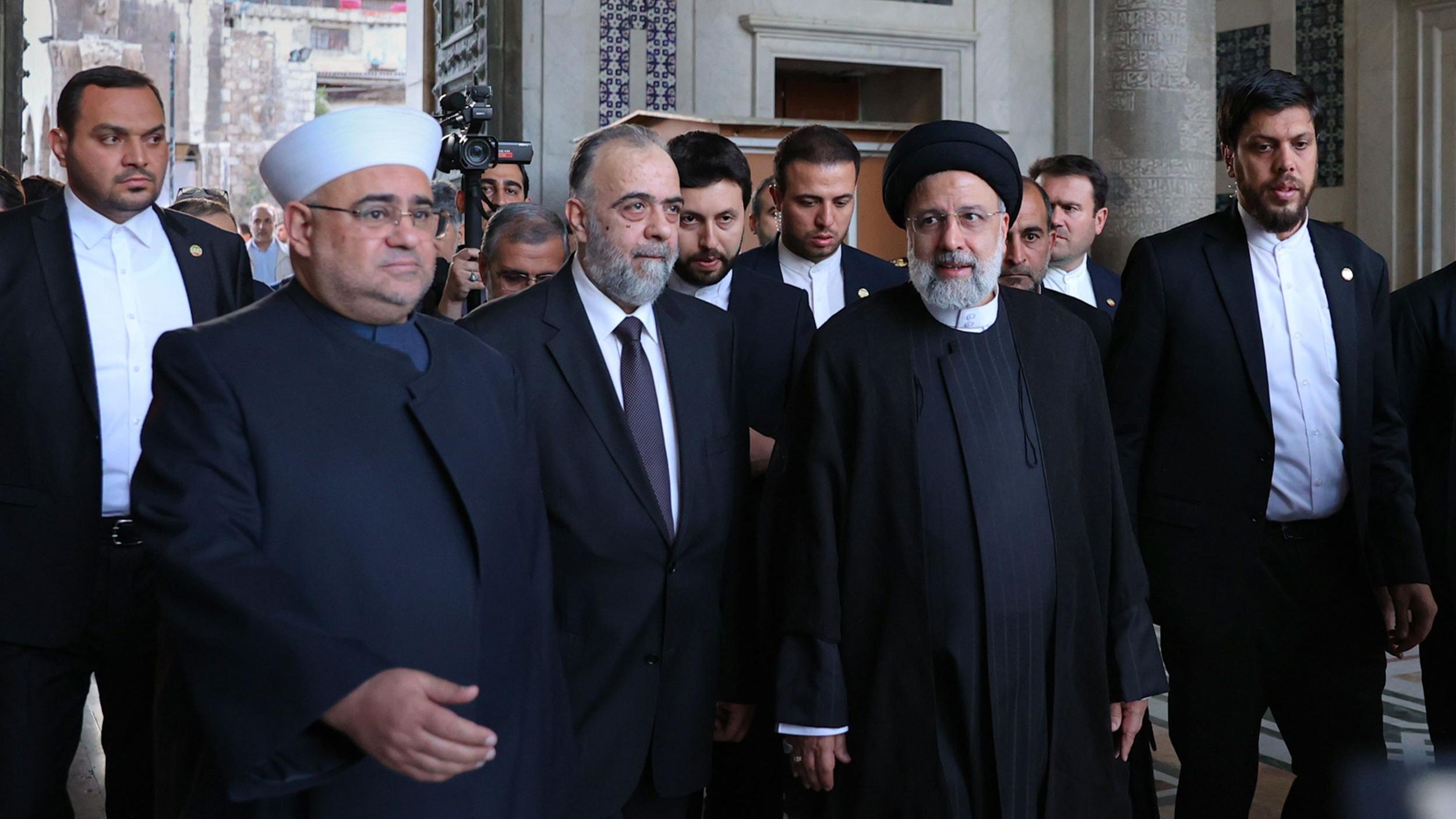 Iranian President Ebrahim Raisi (right) visits the landmark Umayyad mosque in Damascus on May 4, 2023. (PHOTO / AFP)
Iranian President Ebrahim Raisi (right) visits the landmark Umayyad mosque in Damascus on May 4, 2023. (PHOTO / AFP)
The United States’ meddling in Iran and Syria, both of whom have been mending fences with their neighbors in recent months, runs counter to regional aspirations for progress and reflects its unwillingness to accept the multipolar realities in the Middle East, said analysts.
Ali Khansari, an international affairs analyst and graduate of regional studies at Allameh Tabataba’i University in Teheran, said that various wars, conflicts and economic crises “are all the result of the direct or indirect intervention of the United States”.
Wang expressed China’s readiness to further strengthen mutual cooperation with Iran, insisting that Teheran is Beijing's "strategic partner"
The US "has continued its unilateralism through excessive use of force and economic sanctions, and this has caused problems in some countries such as Iran and Syria,” Khansari told China Daily.
READ MORE: Iranian president says Syria visit 'turning point' in ties
Iran and Syria have been making amends with their neighbors in recent months. The Chinese-brokered Iran-Saudi rapprochement in March was followed by Syria’s reinstatement into the Arab League in May.
But leaders in the region have vented frustration over the continued interference of US officials in domestic and regional affairs, be they political, economic, or even military.
In his meeting with Alexander Lavrentiev, the Russian president’s special envoy for Syria, on July 25, Syrian President Bashar al-Assad blamed the US for causing "a state of global instability”, Syrian state news agency SANA reported.
Geir Pedersen, the UN special envoy for Syria, told the United Nations Security Council on July 25 that months of “potentially significant diplomacy” had not yielded any outcomes or political progress for the Syrian population both inside and outside the country. The Arab country remains divided, both territorially and on various issues, and must grapple with the presence of five foreign armies.
"This month saw airstrikes attributed to Israel, reports of Turkish drone strikes, reports of pro-government airstrikes north of Aleppo, and the US saying it carried out drone strikes on an ISIL leader near al-Bab," Pedersen was quoted as saying by Xinhua News Agency.
Jawaid Iqbal, chairman of the Department of West Asian and North African Studies at Aligarh Muslim University in India, told China Daily that the continued US presence in Syria and sanctions against Iran are "evidence of the American empire’s unwillingness to come to terms with the multipolar realities that are afoot in the Middle East”.
The Saudi-Iranian and Gulf-Syrian reconciliation, he said, indicates a new world order in which regional integration and cooperation are placed “above the unipolar power of the US”.
He pointed out that the US-led support for anti-Assad rebel militias during the Syrian civil war had produced “a massive humanitarian crisis, leading to an influx of refugees into neighboring countries and thus straining socio-economic balance”.
In an emergency session in the Syrian parliament on July 24, Syrian Prime Minister Hussein Arnous warned that the country's economic turmoil was worsening as the national currency continued to depreciate.
Arnous blamed the Washington-led economic sanctions, the massive earthquake in February, and the presence of US forces and their allied militias in energy-rich areas in eastern Syria, for having exacerbated the situation.
In Teheran, Iranian Foreign Ministry spokesperson Nasser Kanaani on July 24 slammed the US’ illegal “unilateral and cruel sanctions” involving Iran’s frozen funds from Iraq and South Korea, which have made it difficult for Iran to carry out smooth exchanges with other countries.
The sanctions followed the US’ unilateral withdrawal from the 2015 nuclear deal, known as the Joint Comprehensive Plan of Action (JCPOA), when Washington reimposed sanctions on Iran, affecting bilateral ties between South Korea and Iran.
“By signing the JCPOA agreement, Iran was trying to solve the security problem of its nuclear program created by the US and pursue its growth and development according to the 2025 Development Document,” said Khansari from Iran.
“Still, the unilateral withdrawal of the US severely affected the economic interests and national value of Iran's currency and prevented the cooperation of Iran and other countries,” he added.
Meanwhile, Iranian media reported that Iran Secretary of Iran’s Supreme National Security Council Ali Akbar Ahmadian lauded China’s balanced policy toward the Middle East and its efforts to ensure regional peace.
READ MORE: Iranian president in Damascus for first visit since Syrian war began
"In addition to its huge economic benefits, Iran's cooperation with China sets the ground for regional security," Ahmadian was quoted as saying in a meeting with Chinese top diplomat Wang Yi on the sidelines of the 13th Meeting of BRICS National Security Advisers and Representatives in South Africa.
Wang expressed China’s readiness to further strengthen mutual cooperation with Iran, insisting that Teheran is Beijing's "strategic partner".
“Unlike (the US), which wants the continuation of international crises and a significant amount of tension in the region and fuels it with its actions, China wants peace and stability, and to solve problems in the Middle East,” said Khansari from Iran.
Contact the writer at jan@chinadailyapac.com


